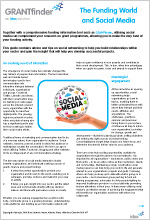Expert corner
Our 'Expert Corner' series will ask different funding experts to share their experiences.
Featured expert – Dr Ritchie Head
Dr Ritchie Head – a North-West based research manager who has worked on over a hundred European projects over the last 15 years – shares his expertise on getting involved in Europe.
Difficult to access, bureaucratic, centred on new Member States – these are all misconceptions that are bandied around about EC funding. Not so, protests Dr Ritchie Head, whose efforts to secure European funding has paid dividends for his organisation as well as others he has advised over the years.
Here he tells how he has managed to navigate the European landscape to secure several millions of pounds of funding.
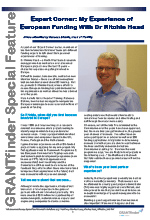
Other insight from our team of information specialists
Horizon Europe: Building on the Success of Horizon 2020
The long wait is over. On 7 June 2018, European Commissioner for Research, Science and Innovation Carlos Moedas held a press conference in Brussels launching the Commission's proposals for the successor programme to Horizon 2020 – Horizon Europe.
Having built a global reputation as a world leader in research and innovation programming, the Commission believes the successor to Horizon 2020 should capitalise on this strong brand name. Horizon Europe aims to enact an 'evolution not a revolution'. Set to launch in 2021, Horizon Europe will build on the achievements and success of Horizon 2020, bridging the past and the future of research and innovation in Europe.
Download a copy of this guide (Horizon Europe: Building on the Success of Horizon 2020)
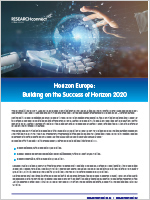
The 5 most common mistakes in preparing and drafting grant proposals
In this article, GrantFinder Senior Consultant Remco van der Zouw describes what he's learned over years of working in grants consultancy and management.
In my career as a grants consultant, I have supported all kinds of organisations and funding programmes on many different subjects. Over this 10+ year period, I have often seen people make the same mistakes in preparing, writing and submitting grant proposals.
Download a copy of this guide (Horizon Europe: Building on the Success of Horizon 2020)
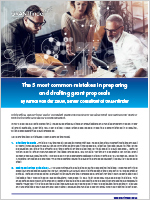
89% of councils opting for alternative funding post Brexit
With a recent study indicating that the majority of local authorities have made no provision for Brexit in their medium-term budgets, there is now a real risk if a 'no deal' scenario goes ahead after 29 March. What does a potential blackhole in funding mean for local authorities already beleaguered by austerity?
This article considers how local authorities may best attract funding to their local areas through applying to EU funding whilst the current arrangements still apply as well as considering alternative funding sources beyond the EU.
Download a copy of this guide (Horizon Europe: Building on the Success of Horizon 2020)
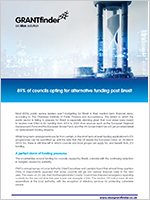
Gender Equality in Research: From Policy to Practice
The theme of gender inequality is often met with resistance, from both women and men, whenever it is raised. This is perhaps due to the fact that many women worldwide are now encouraged and empowered to follow whichever career they choose, and can be seen repeatedly succeeding on their own merit. Statistically, women now account for 60% of undergraduates and 47% of PhD graduates in the EU and – according to the National Science Foundation (NSF) – they earn about half the doctorates in science and engineering in the United States. On paper, these statistics suggest that the battle against gender inequality has already been won.
However, whilst the pool of highly-qualified women is larger than ever before, the reality is that the presence of women in (predominantly STEM-based) research has not advanced at the same rate as the number of women attaining PhDs. Ultimately, this means that the research sector is not yet fully benefitting from the wealth of female knowledge and innovation available.
This paper examines the most recent statistics relating to gender in research; the reasons why women 'drop off' the research radar; what is currently being done to tackle the issue of gender equality in research worldwide; and what could be done to improve the percentage of women in research in the future.
Download a copy of this guide (Horizon Europe: Building on the Success of Horizon 2020)
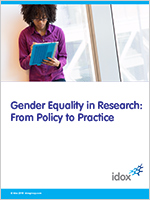
Is the Ceiling Made of Concrete?
Statistics revealing that only 2.1% - 3.3% of academic managers, directors and senior officials in the UK (Northern Ireland being the lowest and Wales the highest) are Black, Asian and Minority Ethnic (BAME) indicate a continuing lack of opportunity for their career progression within higher education institutions. This is despite significant increases in the number of students from BAME backgrounds attending university, and in spite of universities being required to eliminate race discrimination and proactively advance race equality under the Equality Act 2010. The statistics highlight the difficulties that BAME staff and students continue to face in their efforts to progress through the academic hierarchy and denote that more still needs to be done to advance the rate at which qualified BAME researchers and academics are able to progress.
This paper examines recent data relating to ethnicity in academia and research; what is currently being done to tackle the issue of racial equality in research and higher education institutions (HEIs); and what other measures can be actioned to improve the percentage of BAME individuals in academia in the future.
Download a copy of this guide (Horizon Europe: Building on the Success of Horizon 2020)

The Third Mission
University-industry collaboration has turned from 'a welcome development to an absolute necessity' notes Universities UK in its 2014 analysis of the university funding environment.
This element of university work – what's known as the 'Third Mission' – represents the increasing importance placed on university and business partnerships and the evolving role of educational institutions.
Idox's The Third Mission: An Overview of University-Industry Collaboration examines some of the benefits, barriers and support measures in place for cross-sector partnerships, the strengths and weaknesses of R&D activity in the UK compared to global competitors, and outlines key recommendations on what makes a successful partnership.
Download a copy of this guide (Horizon Europe: Building on the Success of Horizon 2020)
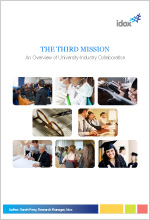
Business Funding Outlook
In these difficult financial times, businesses are doing all they can to identify new sources of funding to boost their growth and development. Funding programmes are available to support a wide range of business activities – but how do entrepreneurs and business owners identify them quickly and cost effectively?
Idox's Business Funding Outlook examines some of the issues businesses are facing in the current economic climate, the role of organisations (such as local authorities, Local Enterprise Partnerships and Business Improvement Districts) in helping them to identify and access support in line with their key priorities, and the types of support available to help them achieve success.
Download a copy of this guide (Horizon Europe: Building on the Success of Horizon 2020)

Achieving Higher Education Growth
'The UK has witnessed the dawn of a new era in Higher Education' notes Dr Tim Vorley of Sheffield University Management School.
Achieving Higher Education Growth - An Overview of International Competitiveness and Student Recruitment provides insight into the challenges faced and strategies adopted by the UK Higher Education sector in order to grow. Utilising facts, findings and case studies, this document offers timely information into what UK universities are currently doing – and aim to do in the future – to compete internationally.
Download a copy of this guide (Horizon Europe: Building on the Success of Horizon 2020)
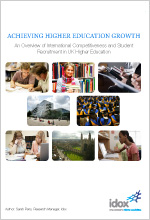
The Funding World and Social Media
Social networks may not seem like the first place to look when seeking grants, but the incredible growth of social media in the last decade has undoubtedly changed the funding landscape. Visibility on these networks can benefit organisations large and small.
The Funding World and Social Media is a free GrantFinder guide offering information that can support your funding search, help you develop a web presence and improve your chances of winning funding. It explains the value of key social networks, how to use them and how they can help position your organisation for success in the world of grant-making.
Download a copy of this guide (Horizon Europe: Building on the Success of Horizon 2020)
